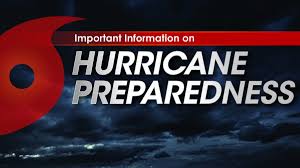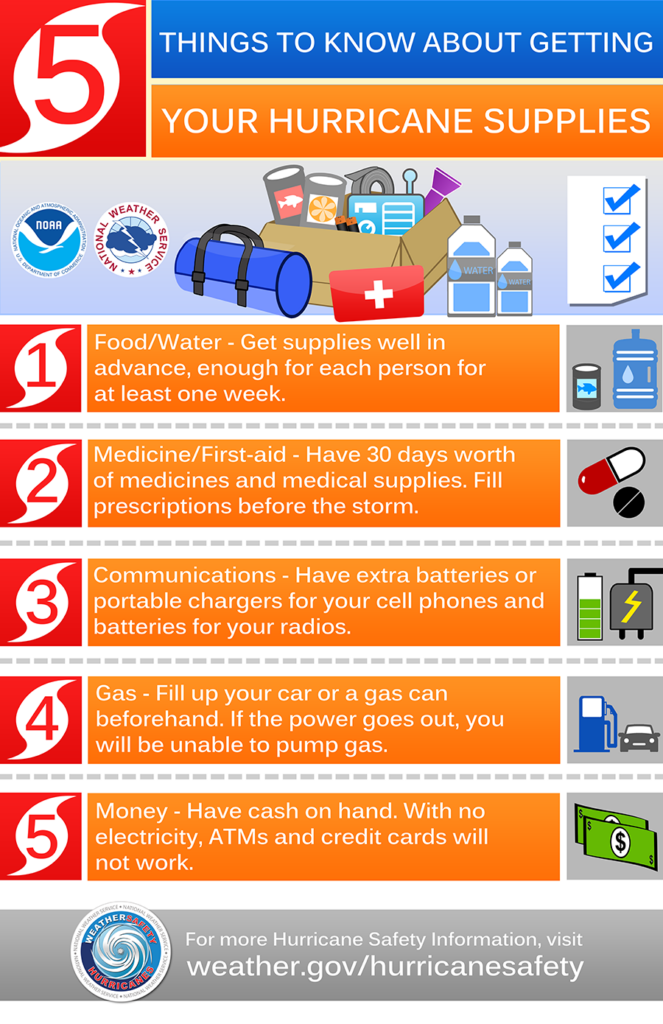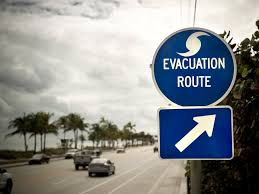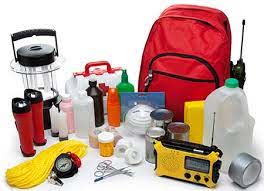
Caregiving is stressful and challenging, that’s an understatement. Caregiving in the midst of hurricane season adds new challenges and reminds us of the need to preplan. Preplanning can reduce your frenzy when a hurricane is looming in your area. Hurricane season begins on June 1st and ends on November 30th; unfortunately, Mother Nature does not abide by a calendar, with storms occasionally falling outside of the typical season.
The 2020 hurricane season is predicted to be a busier than normal season; as such, caregiving in the midst of hurricane season will require a bit more foresight and preparation. COVID-19 has added a few challenges to hurricane preparedness. Social distancing, reduced in-person shopping hours, and product availability have resulted in delayed or incomplete hurricane preparedness.

Being Prepared
Successful and less stressed caregiving in the midst of hurricane season requires thoughtful preparation. Consider your personal situation; mobility limitations, dependence on medical equipment, need for professional caregivers, and the probability of flooding and evacuation. Reflect back on your previous hurricane preparedness experiences, what went well and what do you need to differently to prepare this year? Realize that caregiving needs may have intensified, and dependence on paid caregiving assistance may have grown. Consider your ability to manage without paid caregivers and what you can do to ease your caregiving burden before the storm strikes.
Given the current COVID-19 pandemic, the importance of early preparations cannot be understated. Plan to be able to manage for 14 days, with the very real possibility of the loss of electrical power and water. Last minute planning will leave you without necessary supplies, and the real possibility that you may not be able to obtain regularly needed caregiving assistance and support.
Special Needs
For those living in their own home with a loved one with special medical needs, contact and register with your local fire department and/or office of emergency services for special assistance before a storm is forecasted. This is especially important for those who have power dependent medical equipment. Preregister for space at a medical shelter; these facilities typically are set up with backup power to meet the needs of individuals with extensive care needs. Preregistration is critical to ensure that they can meet your loved one’s needs. Those with a loved one who uses continuous oxygen should touch base with their vendor to ensure that they will have sufficient back up oxygen, and are able to open the backup tanks.
Alzheimer’s & Dementia Considerations
Additional considerations are needed for those with Alzheimer’s and dementia. The disruption in routine and potentially setting can trigger behavioral changes. Enroll in MedicAlert® + Alzheimer’s Association Safe Return®, a 24-hour nationwide emergency response service for individuals with Alzheimer’s or related dementia that wander or who have a medical emergency. Call toll-free at 1.888.572.8566 or visit Alzheimer’s Association. If you are already enrolled in MedicAlert + Safe Return, make sure your information is current.
Home Health/Hospice/Professional Caregivers
These individuals are your key support system, check in with them to discuss your personal situation. Be ready to review with them the need for additional medications and supplies to get through the storm; accounting for potential delivery disruption. If you need to leave your residence, be sure that they know where you will be, and how you can be reached.
Food
- Bottled water – at least one gallon per person, per day. Additional water may be needed for food preparation and sanitation.
- Nonperishable food – consider what you will eat with the loss of refrigeration or water. This is especially important if there are dietary restrictions or special needs. Canned goods and prepackaged items, jam, peanut butter, prewashed fruits and vegetables, dried fruits, protein bars, etc. Don’t forget the hand operated can opener.
Utility Interruptions:
The typical inclination to light candles when there is a power interruption is a safety hazard when oxygen is in use. You will need to rely on flashlights for illumination.
- Keep “reusable” ice packs in the freezer. Fill empty spaces in your freezer with plastic container of water, this will help to keep frozen food items cold for a longer time should there be a power loss.
- Once the storm is announced, begin freezing extra ice cubes for the use in coolers.
- Locate and charge battery operated equipment (fans, flashlights, cell phones, radios, medical devices, etc.) gather batteries for use in non-chargeable flashlights, etc.

Medications, Medical Supplies and Equipment
Ensuring that you have an adequate supply of those critical items, including incontinence products needed to keep you loved one comfortable. Pack items in plastic resalable bags, to minimize the change of packaging getting wet or torn if evacuation is necessary. Label bags with your loved one’s name, in the event of evacuation the contents can be returned to you.
Don’t leave anything to chance, have at least the two week supply of prescription medications (including the ones used occasionally and a vital to keeping your loved one comfortable), supplies, and any needed back up equipment. Minimize the chances of being caught off guard, COVID-19 back log issues and storm related disruptions means medications and supplies are not always making it to store shelves on time.
Social Connections
During times of illness and crisis, social connections take on even greater importance. None of us can survive caregiving without support. Think of how nice it is to get that unexpected call, checking to see how you are doing with an associated genuine offer of specific assistance. As you are preparing for inclement weather, be sure to check with others as to their status and let them know you plans in the event of your need to go to a shelter or evacuate.
Caregiving Support
Consider the sources of assistance that you are currently depending onto assist you with caring for your loved one.Are you utilizing a patch work of care givers? Do you employ private caregiver, services from a personal care or home health agency and/or hospice? Reach out to them as soon as possible to explore what arrangements can be made to assist you ahead of the storm. Realize that given these individual’s personal circumstances, and post storm conditions, the caregiving assistance routine may not be available to you and your loved one.

Sheltering or Evacuation
Whether you are preregistered at a special needs shelter of will be seeking shelter at an emergency shelter, have a plan as to how you are going to get there. Consider your ability to transport your loved one in inclement weather and the need for professional assistance due to the medical needs. Don’t leave anything to chance. Know the location of the nearest emergency shelter.
Pets
Typically, special needs shelters are not able to take pets; plan for how your special friend will be cared for, should you need to leave your home. Have a plan for who will take care of your pet, do not wait to address this as you are evacuating. Check out Preparedness for People with Pets.

Your Checklist
- List of emergency contacts
- List of medical providers
- Copy of Advance Directives
- Recent picture of the person with dementia
- 14 day supply of prescription and over-the-counter medications/occasionally used (constipation, diarrhea, agitation, nausea…), medical supplies, and equipment
- Face masks for yourself and for your loved one (providing the loved one can use the face mask)
- Self-closing bags of various sizes to store medications, important papers, medical supplies, food, easy on/off clothing and other items
- Plastic garbage bags
- Sanitizing wipes
- Incontinence products
- Spare pair of glasses
- Extra hearing aid batteries
- Personal care wipes
- Paper towels
- Manual can opener
- Flashlight, portable radio, batteries
- First aid kit
- Cell phone and (solar) charging kit
- Cash (ATMs may not have power or be filled)
- Evacuation bag with personal hygiene items, good walking shoes, blankets/sleeping bags, travel food, masks, extra pair of glasses, and lists of crucial contacts and medications list.
- Pets – food and water for your pet(s)
Eliminate the burden for yourself, and don’t wait to get the needed supplies and resources in place to a “weathering the storm.” Avoid the last-minute frenzy. Your preplanning foresight will help you focus on the caregiving routine.
Resources
DISASTER PREPAREDNESS, For Seniors By Seniors
Disaster Preparedness for Alzheimer’s Caregivers
Personal Preparedness for Older Adults & Their Caregivers
